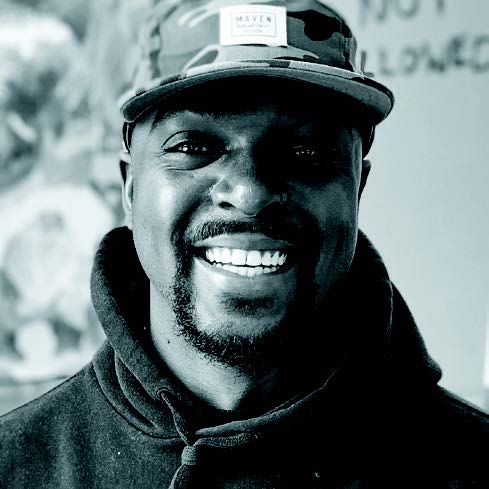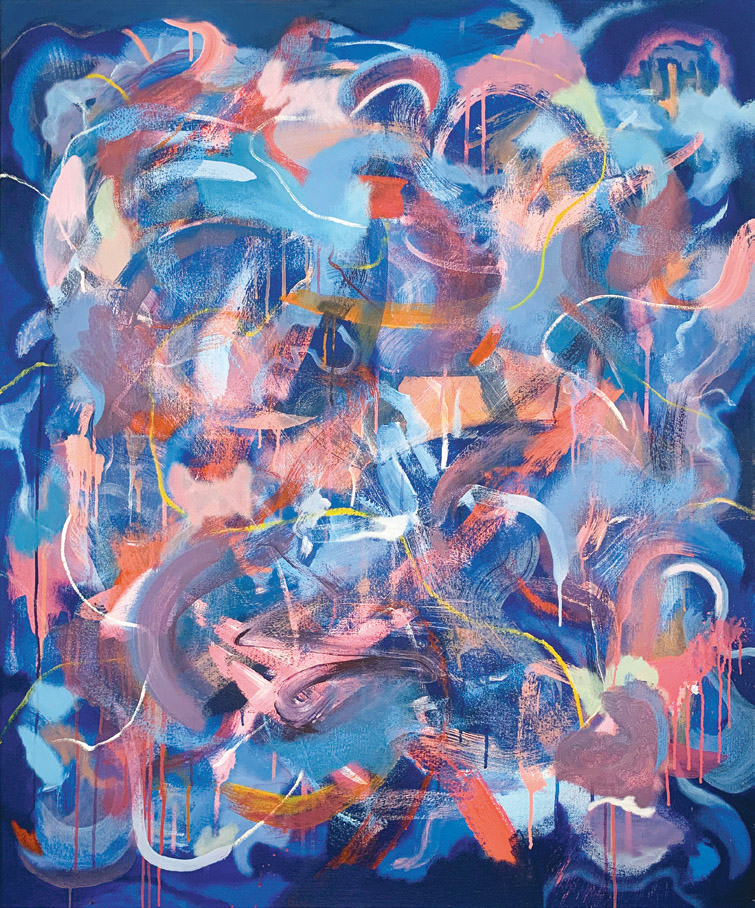Kevin Xiques
“We saw the pond where Monet painted the waterlilies and for some reason, I can’t tell you why, it changed things for me.”

Within a tidy Maine studio, whose dimensions recall the interior of a cube, Kevin Xiques’ large abstract paintings radiate energy. Like nebula systems, they churn with translucent color and movement alongside darker and more opaque boundaries and apertures. Reminiscent of early 20th-century abstraction as well as the works of Helen Frankenthaler and Joan Mitchell, his paintings bring Modernism’s spirit of invention and revelation into the present, offering the viewer a sense of entering into a generous and lively visual conversation.
These compositions light up the small space where Xiques has installed them, using this studio, at Portland’s SPACE Studios building, as an adjunct to his larger residency space across town, at the Black Seed Studio. Xiques is the current David C. Driskell Fellow through Portland’s Indigo Arts Alliance; Driskell Fellows receive access to the 500-square-foot Black Seed Studio as well as grant support for their studio practices. Indigo Arts Alliance was founded in 2018 by Marcia and Daniel Minter as an organization that catalyzes artistic leadership and creative opportunities for BIPOC artists in Maine and beyond. As a Driskell Fellow, Xiques has entered the center of Maine’s cultural dialogue.
Xiques embodies the same spirit of generous connectivity that his paintings convey. Raised and educated in Vermont, he spent several years in New York before relocating to Portland with his partner Helen Mohney in 2020, at the outset of the pandemic. As a counterpoint to many artists who have invested years in arts education, Xiques is self-taught, and this motivation is apparent in the sharp intellect, roving curiosity, and positive energy that characterize both his artwork and personal approach to his practice. With a degree in philosophy from UVM and no formal training as a visual artist, Xiques often joined Mohney (a talented artist in her own right) on visits to New York’s major museums. A trip to France, specifically Monet’s garden in Giverny, galvanized Xiques’ growing interest in painting. “We saw the pond where Monet painted the water lilies. It was gorgeous. And for some reason, I can’t tell you why, it changed things for me,” he says. “I came back to New York with a whole different outlook. It was really crazy.”

Back in New York, Xiques bought himself a MoMA membership. The museum was a site of intense fascination and intellectual growth, and he found himself drawn to the work of Kara Walker and Jean-Michel Basquiat. For two months, every free day was spent walking between Walker’s and Basquiat’s work, looking and learning. Soon he had begun a personal crash-course in photography, the ideal medium through which to perfect compositional strategies. Next, he moved on to drawing, and eventually, with Mohney’s encouragement, to painting. In this manner, Xiques progressed in the Bauhaus tradition, mastering composition, line, and color, all while continuing to learn from the artworks in New York’s museums. Within painting, he found the expressive freedom and fearless experimentation that defines his work.
Moving to Maine marked a transition for Xiques. He intuited that staying in New York wouldn’t lead him fully in the direction of creative action and productivity, and wanted to return to New England. Having visited Portland in the past, he and Mohney—originally from central Maine—set about relocating. Once settled in Portland Xiques was befriended by Maine arts luminaries John Bisbee and Emilie Stark-Menneg. Well-known for their communityminded energy and positive spirits, his friendship with Bisbee and Stark-Menneg proved to be a wonderful point of connection, and Xiques was soon showing his work across the state, including at Dowling Walsh Gallery in Rockland, where he is now represented and will have a solo exhibition of new work this year.
Now engaged in his new series of paintings in the Black Seed Studio, Xiques looks back on his transition from rural Vermonter, to New York City shop clerk and museum-goer, to full-time professional Maine artist. Having recently completed a set of commissioned pieces and several paintings for small shows, the David C. Driskell Fellowship has allowed him to fully focus on his new work. “It’s just a huge honor and privilege, and I feel incredibly blessed and grateful,” he says of the fellowship, which has also had the benefit of focusing his intentions as a Black artist in Northern New England. “I’ve been waiting to pour myself into something…for a long time, I thought, ‘oh, I need to find that thing.’ And when I get hungry for something, it’s to the utmost level.”
